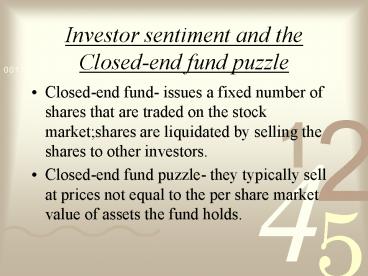Investor sentiment and the Closedend fund puzzle
1 / 7
Title:
Investor sentiment and the Closedend fund puzzle
Description:
Investor sentiment theory- discounts on closed-end funds ... Noise traders' sentiment is stochastic and cannot be perfectly forecasted by rational investors ... –
Number of Views:150
Avg rating:3.0/5.0
Title: Investor sentiment and the Closedend fund puzzle
1
Investor sentiment and the Closed-end fund puzzle
- Closed-end fund- issues a fixed number of shares
that are traded on the stock marketshares are
liquidated by selling the shares to other
investors. - Closed-end fund puzzle- they typically sell at
prices not equal to the per share market value of
assets the fund holds.
2
Possible reasons for discount prices of
closed-end fund shares
- Agency costs
- Tax liabilities
- Illiquidity of assets
- Investor sentiment theory- discounts on
closed-end funds reflect expectations of
individual investors
3
Four pieces of the puzzle
- Closed-end funds start out at a premium
- Although they start at a premium, the funds sell
at a discount within 120 days - Discounts on closed-end funds are subject to wide
fluctuations over time - On termination through a liquidation or open
trading, share prices of the funds rise and
discounts shrink
4
Investor sentiment theory
- DSSW present a model of asset pricing based on
the idea that the unpredictability of the
opinions of not fully rational investors impounds
resale price risk on the assets they trade. - Assumptions made by DSSW
- Rational investors' horizons are short
- Noise traders sentiment is stochastic and cannot
be perfectly forecasted by rational investors - Other elements
- -Different clienteles
- -Noise traders are more likely to hold closed-end
funds than assets in funds portfolios
5
Investor sentiment and the 4 part puzzle
- Closed-end funds sell at a discount-due to risk
in holding a fund over its portfolio - Investors buy fund shares at a premium-
- Discounts on closed end-funds experience wide
fluctuations-due to changes in investor
sentiments about future returns - On termination of fund, share prices rise due to
elimination of noise trader risk
6
Predictions of investor sentiment model
- Discounts on closed-end funds will be correlated
- New funds get started when old funds sell at a
premium - Discounts on closed-end funds narrow when smaller
stocks do well
7
Conclusion
- Closed-end fund discounts are a measure of the
sentiment of individual investors. - This sentiment is sufficiently widespread to
affect the prices of smaller stocks in the same
way it affects closed-end fund prices































